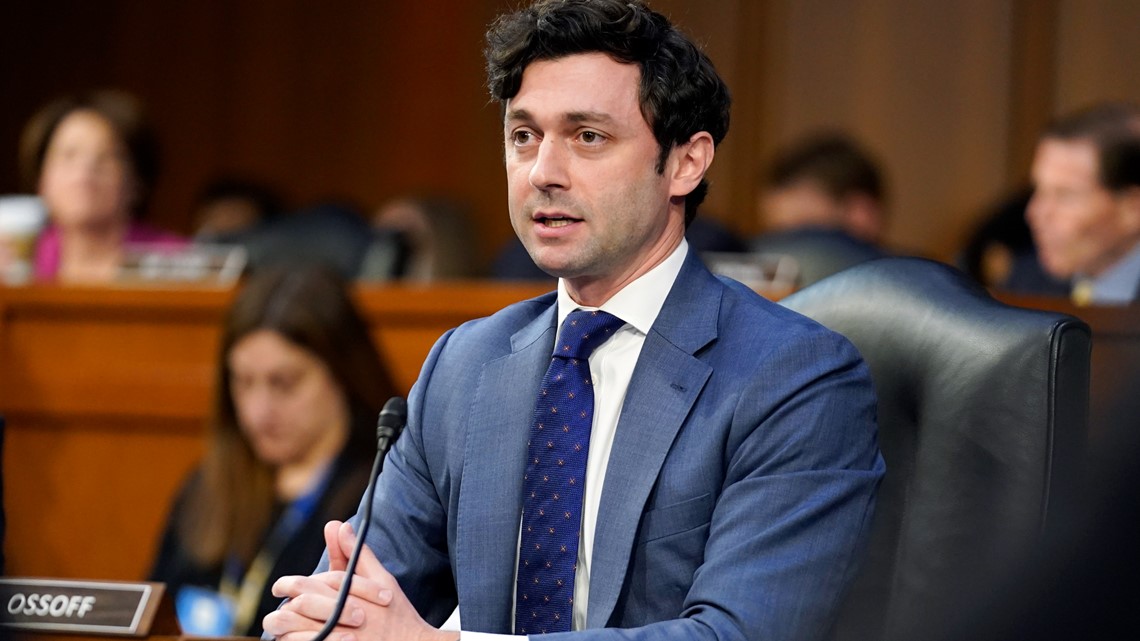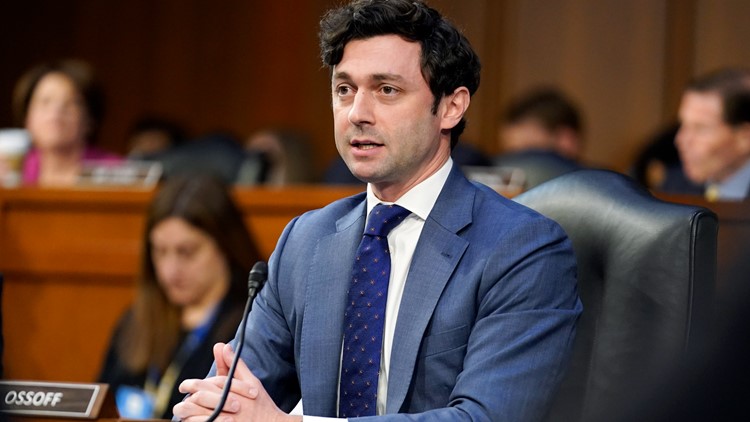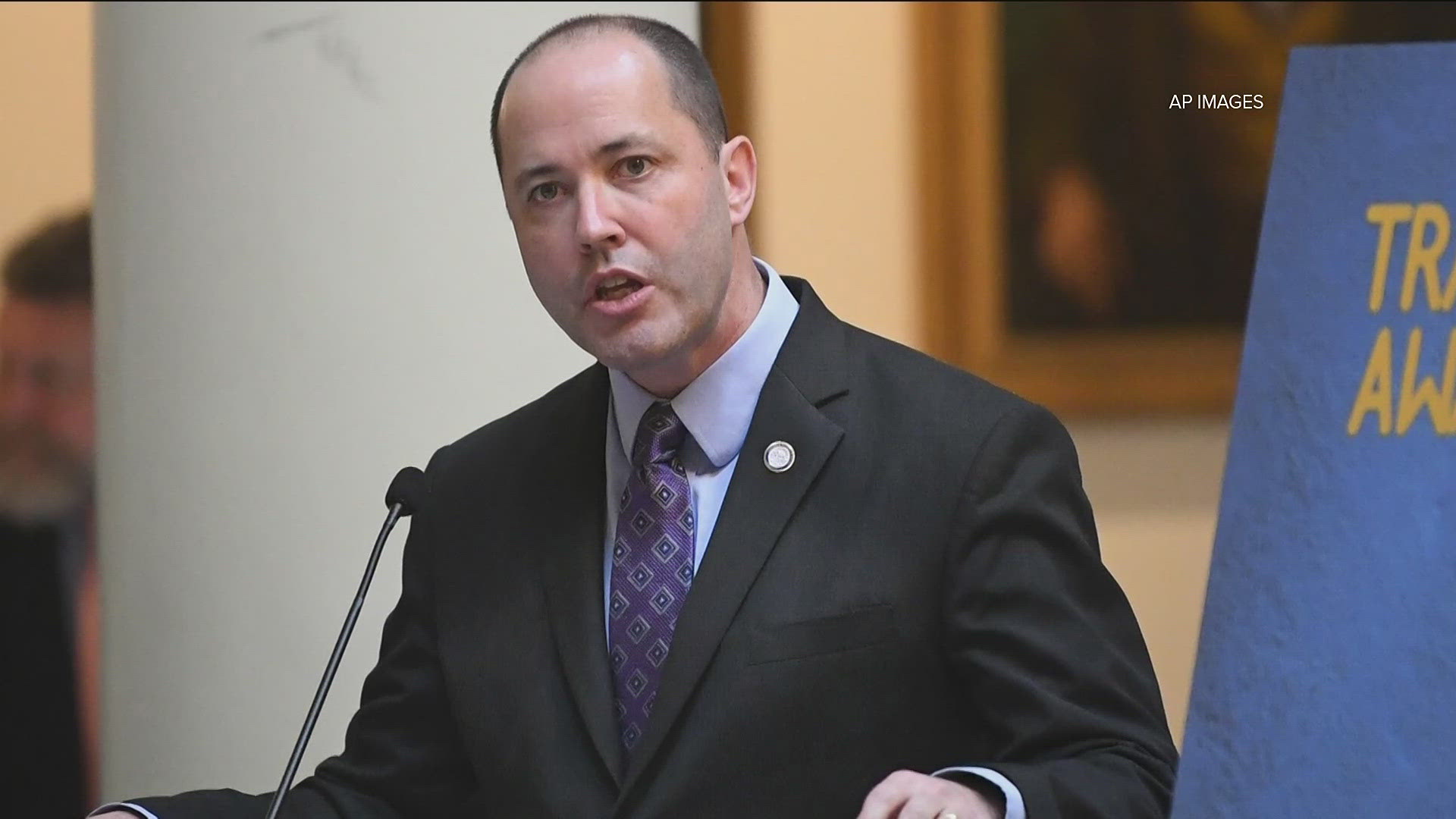ATLANTA — Georgia Sen. Jon Ossoff signaled Monday that his interest in the Supreme Court nomination hearing of Judge Ketanji Brown Jackson will center on how she sees fit to apply constitutional interpretation to "cases whose contours and complexity we cannot yet imagine."
Among the most significant roles the Supreme Court will hold as Judge Jackson could potentially sit on the Court "well into the middle of this century," Ossoff said, is how to interpret America's founding legal document in a rapidly changing world.
RELATED: WATCH LIVE: Ketanji Brown Jackson gives opening statement at Supreme Court confirmation hearings
"Among the Court’s most challenging tasks are to grapple with unsettled law when the stakes are highest — or even existential — for individuals and for the country," Ossoff said. "And to apply the Constitution faithfully over the long arc of history, as the world changes in profound ways, and the text of faithful Constitutional interpretation meets new facts, new contexts, and new technologies."
Judge Brown Jackson, of the D.C. Circuit Appeals Court, is President Joe Biden's nominee to succeed Justice Stephen Breyer on the Supreme Court. Ossoff, as a member of the Judiciary Committee, will play a direct role in her nomination hearing.
If confirmed, she would become the first Black woman to ever sit on the Court.
Ossoff highlighted this potential to make history in his opening statement, and noted the role the Court often has held in guaranteeing rights the Constitution grants but that "in practice... are still too often broken for too many of our fellow Americans."


“In a nation still striving to transcend the legacies of slavery, and segregation, and institutionalized racism, through your brilliance, and resilience, and hard work, you have already rendered great service to the nation as a Federal judge," he said. "And as a Black woman, you have overcome deeply rooted obstacles to earn nomination to our nation’s highest court for the first time in history."
Ossoff outlined several areas of particular legal interest he said he was interested in hearing Jackson's thoughts on. Those included "protections against unreasonable search and seizure in an age of ubiquitous surveillance," "disputes over war powers where law remains unsettled between Executive and Legislative claims," and "questions pertaining to freedoms of speech and of the press."
Following the opening statements by senators on the Judiciary Committee, they began Monday afternoon what will be a dayslong process of vetting Jackson in an "advice and consent role" that Ossoff called "vital to the integrity and legitimacy of the Court."
Sen. Ossoff's full statement
“Thank you, Mr. Chairman, Ranking Member Grassley.
“Judge Jackson, good afternoon. Good afternoon to your family. Congratulations to your family.
Congratulations to you for your nomination, and welcome back to the Judiciary Committee.
“I engage in these proceedings with deep respect for the responsibility that the Senate has to advise and consent on the lifetime appointment of a Supreme Court Justice who would be responsible for interpreting and applying Constitutional and statutory law in the most complex and contested and nationally significant cases.
“The Constitution was a groundbreaking document when written, and still by today’s standards, as amended, considering the tyranny that prevails in much of the world, its guarantees of liberty, and privacy, and due process are exceptional as a governing document.
“Often in our history it has fallen to the Court, through its decisions, to ensure the enforcement of those guarantees.
“Yet our Constitution’s guarantees of individual rights and equal protection under the law remain too often and for too many unfulfilled.
“For any colleagues who doubt this I remind them of Ahmaud Arbery’s murder in Glynn County, Georgia, just two years ago, when a young Black man was shot dead in cold blood on camera in the street, and the local authorities buried the case and looked the other way. Only a massive civil rights mobilization pressured state and eventually Federal prosecutors to act.


“For any colleagues who doubt that those promises remain unfulfilled to too many, I remind them that in my state you can predict how long someone must wait to vote by where they live and the color of their skin.
“In practice, the promises made in the plain text of our Constitution are still too often broken for too many of our fellow Americans.
“And so, the Court remains essential to that national process of becoming in real life what America is in text.
“Today’s hearing, Judge Jackson, is evidence that this process continues, and above all a testament to you personally.
“That in a nation still striving to transcend the legacies of slavery, and segregation, and institutionalized racism, through your brilliance, and resilience, and hard work, you have already rendered great service to the nation as a Federal judge.
“And as a Black woman, you have overcome deeply rooted obstacles to earn nomination to our nation’s highest court for the first time in history.
“Alongside our Constitution’s exceptional guarantees of individual rights and equal protection is its exceptional system of checks and balances, restraints on political power imposed by the diffusion of authority across three co-equal branches, between Federal and state governments, with a President and a Federal legislature directly accountable to voters, and an independent Federal judiciary whose judges must be confirmed by elected Senators.
“This Constitutional system has endured and developed for nearly a quarter of a millennium. It is resilient. But democracy remains the exception, not the norm, in history and around the world, and we cannot take the survival of our republic for granted.
“And so I look forward to engaging with you, Judge Jackson, to discuss your perspective on the separation of powers and the resilience of our Constitution when threatened by political actors who would ignore the rule of law or seek to seize power by illegal or extraordinary means.
“Among the Court’s most challenging tasks are to grapple with unsettled law when the stakes are highest — or even existential — for individuals and for the country, and to apply the Constitution faithfully over the long arc of history, as the world changes in profound ways, and the text of faithful Constitutional interpretation meets new facts, new contexts, and new technologies.
“Judge Jackson, should you be confirmed, you may serve as a Supreme Court Justice well into the middle of this Century.
“You will rule on cases whose contours and complexity we cannot yet imagine.
“And so, among several areas of interest, I look forward to learning how you will consider protections against unreasonable search and seizure in an age of ubiquitous surveillance.
“How you might approach disputes over war powers where law remains unsettled between Executive and Legislative claims.
“How you will approach questions pertaining to freedoms of speech and of the press.
And seek that confirmation that you will apply the law faithfully without regard for your own opinions, as my review of your extensive work today demonstrates that I believe you will.
“This Constitutional process of advice and consent is vital to the integrity and legitimacy of the Court.
“And Judge Jackson, on behalf of my constituents in Georgia, I look forward to engaging in that process over the next several days.
“Mr. Chairman, I yield.”


